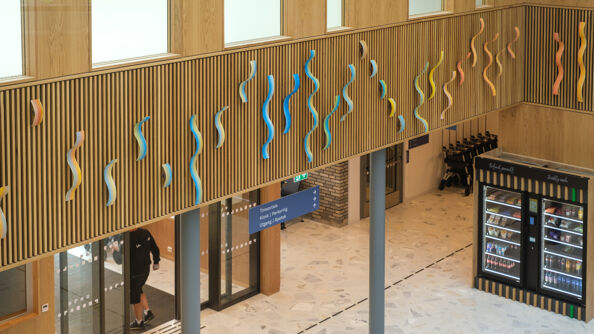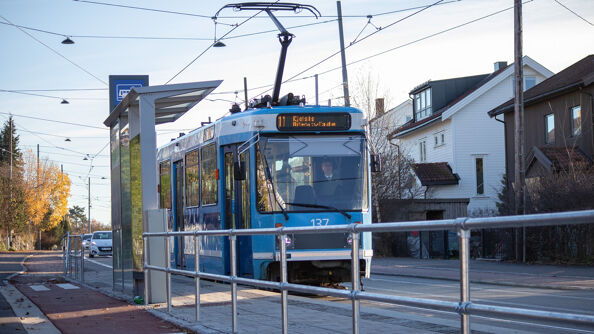Voices from Oslo: Lessons from 15 years working in Norway
Welcome to Voices from Oslo, where we share insights, stories, and lessons learned from internationals in Oslo who have been in your shoes.
Trust, a social safety net, and the subtle art of being a "potato": My reflections after 15 years of working in Norway
by Lorelou Desjardins (15 July 2025)
After fifteen years of working in Oslo—from the public sector to the nonprofit sector, in media and even as a trade union representative—I’ve discovered that Norwegian working life can be both fascinating and, at times, quite confusing.
There's a strong emphasis on work-life balance across Norway, and that extends to Oslo, too (though you can find a bit more of that "hustle culture" here in the capital). From a strong focus on trust and some of the world's most generous leave policies, working in Norway is an experience full of unique customs and expectations.
Here’s what I’ve learned about how to navigate working life in Oslo, and how to thrive in it.

Trust is everything
If there’s one thing I’ve learned, it’s that trust is the foundation of working life in Norway. Leaders will trust you are doing your job, even if they are not looking over your shoulder or micro-managing you. They also trust you will tell the truth.
Once, early in my career in Norway, I made a mistake at work. I’d only been in that office for two months and was terrified of admitting it, afraid my boss would think I was completely unprofessional. But I decided to tell the truth, and it went surprisingly well. My boss appreciated my honesty and helped me find a solution.
That experience taught me that in Norway, it’s far better to admit mistakes than to hide them. People forgive errors, but lying or covering up problems can seriously damage your reputation. Whether you’re dealing with clients, colleagues, or leaders, trust is essential. It creates a calm, respectful atmosphere where people rely on one another without constant oversight. It means there’s less micromanagement, which can feel liberating, but it can also be a bit unnerving if you’re used to stricter supervision.
Quick tip: Trust is especially key in the job search, too, which is why we stress the importance of networking.
Flat hierarchy and casual leadership styles
One of the biggest cultural shocks for me came during my first big meeting in Oslo. I sat there trying to figure out who was in charge! Everyone was speaking, sharing opinions, and discussing details, but nobody seemed to be deciding anything. I kept wondering: who’s the boss here?
That’s a typical experience for newcomers to Norwegian work life. Norwegian workplaces often operate under a flat hierarchy, where leaders act more like facilitators than traditional bosses. Titles exist, but leaders don’t usually sit in private offices or command respect through formality. Instead, they participate alongside everyone else, inviting input and feedback
This approach has many advantages. It encourages participation, makes people feel valued, and creates a sense of equality. But it can also feel inefficient. Decisions can take longer because everyone has a say. In one organisation I worked for, we spent hours discussing even small changes, simply because it was important that every voice was heard.
I’ve learned that in Norway, feeling included in the decision-making process is often as important as the decision itself. It is called medbestemmelse (influencing decisions at work) and is a right employees have in the law. Medbestemmelse means employees have a legal right to be involved in decisions that affect their work. In a typical workplace in Oslo, this might play out in regular staff meetings or through union reps who sit in on leadership discussions. Once leaders do make a decision, however, they expect everyone to follow through, even if some disagreed in the discussion.
Feedback, too, is wrapped in politeness. Early on, I learned that being direct can be seen as rude. It’s essential to stay calm, polite, and often cushion criticism with several positive comments. It’s not about being dishonest—it’s about maintaining harmony and respect.

Sick leave: A safety net for all
Norway’s sick leave system is one of the most generous I’ve seen. During my time as a trade union representative, I often helped colleagues navigate the rules. You’re entitled to stay home for up to 3 days without a doctor’s note, called egenmelding, four times a year. If you’re sick longer, you need a doctor’s certificate. And if your illness continues, you can receive 100% of your salary for up to 52 weeks.
I’ve worked with colleagues who needed time off for physical or mental health reasons, and no one questioned their right to take it. In many other countries, you might fear losing your job for being away. In Norway, taking care of your health is seen as responsible, not suspicious.
In my experience, people in Oslo don’t hesitate to take a sick day when they need it. It’s not seen as lazy—it’s seen as responsible. You can decide to disclose the reason for your sick leave to colleagues and leaders, bu you also have the right not to tell anyone the reason behind your sick leave, allowing for some privacy.
Parental leave shows equality in practice
If there’s one area where Norway truly shines, it’s parental leave. I personally took 11 months of maternity leave when I had my child, and my husband took 5 months. I know this sounds like a lot of time off, but we had a great time, we took care of our child, prepared him to start in kindergarten at 1 year old. Also, depending on how long you want to have a leave, you can get paid 80% or 100% of your salary, and you can even take months of unpaid leave (which I did).
Many parents are stuck and are forced to take a longer leave because kindergartens only take in children from the age of 1 year old, if they are born before December, so some parents take a long leave waiting for a spot in kindergarten. But that is another topic.
Quick tip: Check out Arbeidstylsinet (the Norwegian Labour Inspection Authority) for more information about your rights as an employee in Norway.
Trade unions are a powerful ally
One of the most important, yet sometimes overlooked, aspects of working in Norway is the role of trade unions. Before moving here, I thought unions were mainly for factory workers or those in manual trades. But in Norway, unions are deeply integrated into professional life, whether you work in an office, the public sector, or the private sector.
During my years as a trade union representative, I saw firsthand how unions help protect employees’ rights. Nearly half of Norwegian employees are union members. Membership often means better working conditions, help negotiating salaries, and support if you face conflicts or unfair treatment at work.
When you start a job in Norway, your employer might even ask which union you’d like to join, so that your membership fees can be deducted directly from your salary. Many foreigners don’t know this, but being in a union can also give you access to legal support, insurances, and financial benefits like lower interest rates on loans.
I remember helping colleagues who were unsure about their rights during restructuring processes, or who needed guidance in conflict situations. In many workplaces, union representatives have a seat at the table during important decisions, ensuring employees’ voices are heard. They can’t be fired for fulfilling their union duties, which gives them the security to stand up for others.
If you’re working in Norway, I strongly recommend joining a union relevant to your field. It’s not just about protection, it’s about being part of a system designed to keep workplaces fair, transparent, and democratic.

Be versatile, be a potato
One of the best pieces of advice I ever got was from a Norwegian colleague who told me, “You have to be a potato.” (It’s a common Norwegian expression: ‘å være en potet.’) At first, I thought it was a joke. But it’s actually a compliment. Being a “potato” means being flexible, able to handle different tasks as needed.
In one NGO job, my title was legal advisor, but some days I’d help write press releases, organise events, or even wash coffee cups after a big meeting. Nobody thought it was beneath them. In Norway, rigid job descriptions aren’t as important as pitching in where you’re needed.
And flexibility goes both ways. Norwegians work diligently during office hours, but overtime is not a badge of honour here. People leave on time, and if you’re still sitting at your desk late in the evening, someone might actually ask why. Work-life balance is sacred, and your value isn’t measured by how many hours you’re glued to your chair.
Quick tip: Leaving work on time is normal in Oslo. Staying late regularly might raise eyebrows, not praise!
Building your Norwegian work life
Understanding Norway’s workplace culture takes time. I’ve stumbled, adjusted, and learned to read the subtle signals that guide Norwegian professional life.
It's easy to sometimes mistake polite silence for agreement or assume a quiet office means there’s no conflict. But beneath the calm exterior are the same human dynamics you’d find anywhere, just handled with more restraint and respect for personal boundaries.
If you’re planning to work in Oslo, my advice is simple: show up on time, speak your mind gently, and trust your colleagues. Be prepared to become a workplace “potato,” ready to help out wherever needed.
And remember, benefits like sick leave and parental leave aren’t just perks, they’re part of a culture that values trust, equality, and the balance between work and life.
Because ultimately, working in Norway isn’t just about earning a salary, it’s about belonging to a society where people are trusted, supported, and given space to live full lives, both inside and outside the office.
Some useful resources for working in Oslo:
-
NAV.no — Social benefits and leave
- Altinn.no — Tax and employment forms, starting and running a business
- Arbeidstilsynet.no — Workers' rights
- Oslo Kommune's Welcome to Oslo page — information for newcomers
- The Welcome to Oslo series on YouTube — learn more about living in Oslo
